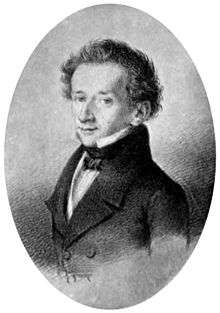Tre Canti di Leopardi
Tre Canti di Leopardi (Three songs by Leopardi) is a series of three orchestral songs composed by Wilhelm Killmayer in 1965 for baritone and orchestra. He set three poems in Italian from the collection Canti by Giacomo Leopardi.
| Tre Canti di Leopardi | |
|---|---|
| Orchestral songs by Wilhelm Killmayer | |
 Portrait of Giacomo Leopardi who wrote the poems | |
| Text | poems from Canti |
| Composed | 1965 |
| Duration | 14 min |
| Movements | three |
| Scoring |
|
History
Interested in poetry and the voice, Killmayer composed more than 200 Lieder.[1] He wrote Tre Canti di Leopardi in 1965 as a setting of three poems in Italian from the collection Canti by Giacomo Leopardi. He wrote the work for baritone and orchestra. The songs take about 14 minutes to perform.[2]
- L'infinito (The Infinite)
- A se stesso (To Himself)
- Alla luna (To the Moon)
From the expansive collection, Killmayer chose three poems from different periods. For the first song, he selected the early L'Infinito (The Infinite, 1819), which begins "Sempre caro mi fu quest'ermo colle" (It was always dear to me, this solitary hill,). He marked his setting "Moderato, tranquillo".[2]
For the second song, he selected the later A se stesso (To Himself, 1833), which has been described as a "suicidal assessment",[3] written in concise lines of sometimes only one to three words per line. Beginning "Or poserai per sempre" (Now you will rest forever), it talks about the death of the ultimate illusion.[3]
For the third song, he selected another early poem, Alla luna (To the Moon, 1819). The beginning, "O graziosa luna, io mi rammento" (O lovely moon, now I am reminded), has been described as an address to a light both ideal ("graziosa luna") and beloved ("mia diletta luna"). Killmayer marked his setting "Tranquillo".[2]
The work was first performed on 11 July 1967 in Munich as part of the festival Allgemeines Deutsches Musikfest München 1967. The soloist Barry McDaniel sang with the Münchner Philharmoniker, conducted by Reinhard Peters.[2] A recording was chosen in 2006 to represent orchestral songs for the sound documentary Musik in Deutschland 1950–2000. It was performed by Thomas Mohr and the Symphonieorchester des Bayerischen Rundfunks, conducted by Georg W. Schmöhe. Other songs of the collection were Henze's Neapolitanische Lieder, Reimann's Lines, and songs by Reiner Bredemeyer, Hanns Eisler, Siegfried Matthus, Ernst Hermann Meyer and Manfred Trojahn.[4]
References
- Schmerda, Susanne (21 August 2017). "Konsequent gegen den Strom" (in German). BR. Retrieved 21 August 2017.
- "Tre Canti di Leopardi / per baritono e orchestra". Schott. Retrieved 10 September 2017.
- Vendler, Helen (2 December 2010). "The Worn-Out Heart". The New Republic. Retrieved 11 September 2017.
- "Orchesterlied (sound recording)". Stanford University. Retrieved 11 September 2017.
External links
- Tre Canti di Leopardi / Song Cycle by Wilhelm Killmayer (1927–2017) lieder.net
- Adam Kirsch: Under the Volcano / Giacomo Leopardi’s radical despair The New Yorker 25 October 2010